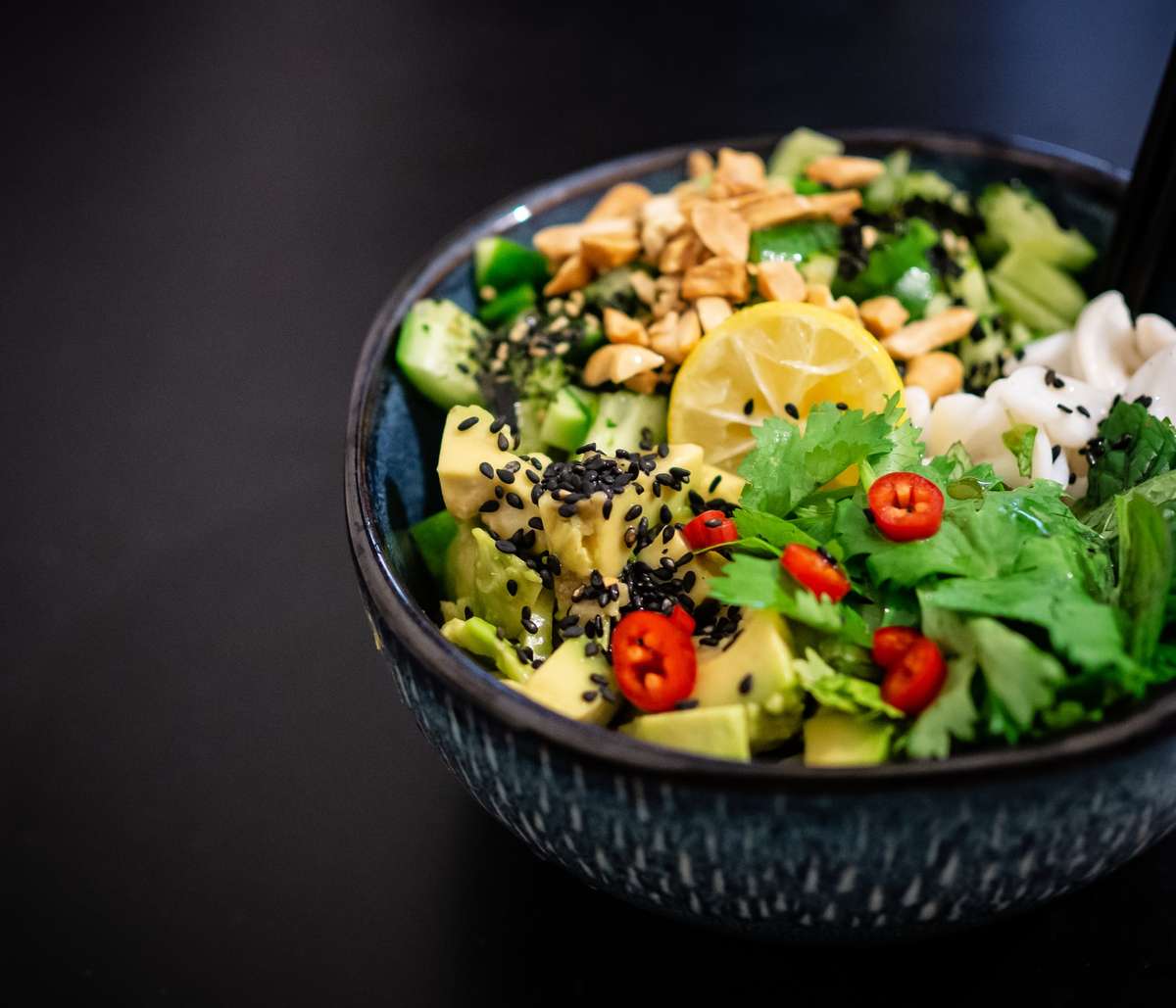Posted on Nov 28, 01:04 PM in Health and Well Being and Workplace Health. No comments.
Over the last few weeks, the temperature has definitely dropped here! Last Saturday morning, I spent a cold half hour scraping ice from my car windows. Yes, winter is here. A lot of my clients are finding the cold weather a bit challenging when it comes to sticking to lunchtime salads. It’s true that when it’s cold, sometimes a salad doesn’t quiet “cut it”. It’s important to keep eating those vegetables though! You could try soup, (which I have nearly every day for lunch in this weather),or go for a warm salad. There are lots of really lovely warm salad recipes around. I think it’s much more fun to invent your own.
Building your salad is just the same process as if you were making a summer salad – but with a few tweaks.
First pick your base- the leafy bit. In colder weather, this should be a leaf that can be eaten warmed – such as rocket, spinach or kale.
Then add your colours and lovely vegetables – go for Mediterranean style roasted vegetables– tomato, onion, beetroot, carrot, roasted florets of cauliflower or broccoli, squash, courgettes, beans, roasted peppers, mushroom, corn, pumpkin, asparagus, olives. Anything goes. It’s wise to cook up an extra portion in the evening to have with your lunch.
Pop in some protein- add lean meats, chicken, fish such as salmon or mackerel, lentils and beans, chickpeas, feta, halloumi, falafels or egg.
Chuck in some carbs- examples that warm up nicely include new potatoes, sweet potato, quinoa, couscous, spelt, rice or pasta.
Top off with some good fats, herbs, flavours and dressings – try adding avocado, seeds and nuts and even warmed fruit.
The sky is the limit with warm salads. You don’t have to face cold cucumber and lettuce on a frosty day. Try playing around with ingredients an see what you come up with.
Anne is a Health Professions Council (HPC) registered dietitian (RD), an Accredited Practicing Dietitian (APD- Australia), a fellow of the Higher Education Academy (FHEA), a member of the British Dietetic Association, The Nutrition Society and of The Dietetics Association of Australia.
Salads, although not essential for a healthy meal, do still make sense in winter! It’s an opportunity to try different ingredients than what you use in a summer salad. Greens: Today’s grocery stores stock all types of lettuce year-round, so you don’t have to switch up your greens for winter.

You may also like:
Get the latest healthy eating updates delivered straight to your email.
This doesn’t mean that you should never eat a salad in the winter but it is best that you are moderate about raw salads and you can make ‘salad’ of (mostly) previously cooked vegetables. I like to toss leftover root vegetables (beets, yam, potato) with a diced boiled egg, avocado, nuts and seeds.
Thank you for your question. The answer is yes and no. In Traditional Chinese Medicine (TCM), consuming raw vegetables (especially in the fall in winter) is inefficient for the digestive system. The body needs to use energy to warm the raw nutrients up and extract the goods –which can leave your energy (Qi) more drained instead of nourished. Contrary to raw food nutrition, TCM nutrition guidance is to lightly steam, sauté, or bake your vegetables to breakdown some of the fibre and “unlock” the vitamins and minerals. I have found the TCM approach to seasonal vegetables (and food) intake to be a good approach. During the winter and fall it is a good idea to look to build vegetable intake from cooked sources.
Choosing a Greens drink that boasts a range of green vegetable, and where possible ingredients that are organic, can be a way to augment your food choices. There are a variety of flavours available so try a few brands to find one that best suits your taste. It is great to have your Greens in the morning (before breakfast) but it can also be a nice afternoon pick-me-up.
My friend told me it was bad to eat salads in the winter. Is this true?
With this in mind, raw salads are best in the spring/summer while cooked vegetables are better support for the fall and winter.
The Only Salad You NEED To Eat! Winter Detox Salad
FAQ
Is it OK to eat salads in winter?
What can I eat instead of salad in the winter?
What is the difference between summer and winter salad?
Can you eat salad at any time?
Why do people eat salad in winter?
Salad is a quintessential warm-weather food. Maybe that’s because it’s usually served cold, or because so many of its typical ingredients, like leafy greens and tomatoes, are in season during that time of year — whatever the reason, a bowl of salad is usually associated with picnics and patios, not sweaters and snowfall.
Can I eat spicy food when I have a cold?
Although after eating spicy food one may feel relieved from the symptoms of a common cold, it is temporary relief and is not the cure for the condition. In fact, eating too much spicy food can cause stomach pain leading to nausea and vomiting.
What can I eat for a winter salad?
Swap in toasted chopped hazelnuts, pine nuts, or whatever nuts or seeds say “winter salad accoutrements” to you. Make all your winter salad dreams come true with seasonal vegetables and fruits like roasted squash, bitter greens, and lots of citrus.
What is a winter salad?
It’s time for the freshest, brightest winter salads you can imagine. We love a cozy plate of pasta or a soothing braise, but at a certain point each year we need winter salads. Something crisp. Something crunchy. A big pile of green vegetables, with snappy texture and vibrant flavor.
